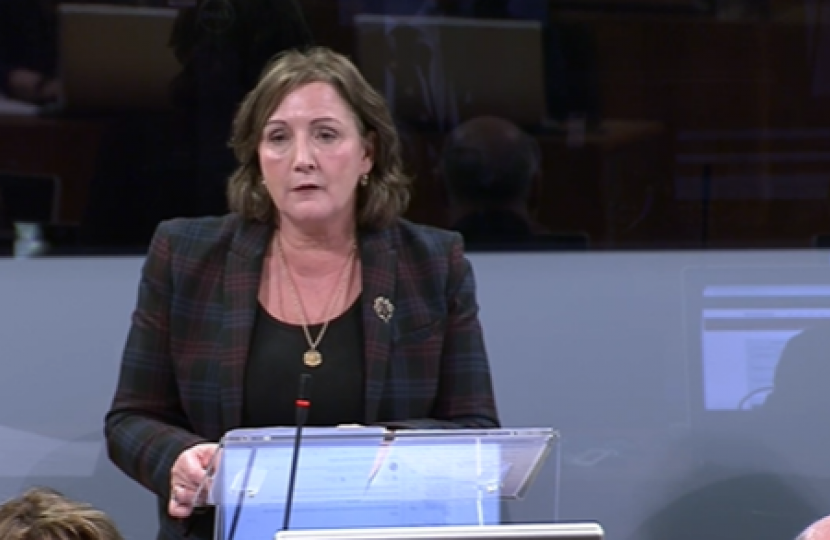
Janet:
Diolch, Deputy Presiding Officer. I am grateful that I have the opportunity to speak in the final stage of the Children (Abolition of Defence of Reasonable Punishment) (Wales) Bill.
This Bill is a free vote among the Welsh Conservative group, and I'd certainly like to reassure Members that, as spokesperson, I have listened to all sides of the debate, all evidence laid before the committee, and all of the Deputy Minister’s own statements on this issue. I was pleased to see engagement throughout the Bill’s progress, as well as some compromise from the Deputy Minister at Stage 3, which led to our amendments on reporting standards being accepted as part of this Bill.
Nevertheless, from my own perspective, I remain still unconvinced that removing the defence of reasonable punishment is right or fair for Wales. As I have said throughout the Bill’s progress, we have laws and systems already in place to protect the rights of the child, and we could have considered other options to change the behaviour of parents, such as civil liability.
With this Bill, the state is now stepping into the private lives of families, and through the involvement of the police and social services to enforce the smacking ban, this will potentially have far-reaching consequences for us all. Exposing parents to criminal liability for smacking their children should be the last resort of a Government, not the first.
It is the short-term thinking of this Government behind a long-term issue that concerns me the most. Today, this Welsh Parliament has been left the choice of passing a Bill that didn't have an in-depth costing for our public services from the start, and we now find out, from a letter that I've acquired, which is from the Chair of the Finance Committee, Llyr Gruffydd, of their concerns that since the explanatory memorandum the Bill has increased from a range of between £2.3 million and £3.7 million, to £6.2 million and £7.9 million. The revised regulatory impact assessment provides a total cost of awareness-raising activities of £2.8 million, previously in a range of £1.3 million; information on out-of-court disposal schemes, not originally costed, is now estimated to cost between £810,000 and £2.5 million; costs for staff working in a safeguarding role, who will need to familiarise themselves with new guidance, has been included—£882,000; costs of the task and finish implementation group, £620,000; and costs of the post-implementation review, £100,000. And it goes on. This is a letter that has been signed by a committee in this Assembly—
Llyr Gruffydd AM:
Would you take an intervention—
Janet:
Yes, of course
Llyr:
—given that you've referred to a letter with my name on it? In fairness to members of the committee, those figures are figures that were requested by the committee, and the Government, in sincerity, provided those figures. There is a disparity between what was initially tabled, and what subsequently was before us, but, of course, that is the whole point of having a scrutiny process. It shows that it does work, and, of course, Members today can vote for or against based on the evidence that the Government, in fairness, has brought forward.
Janet:
Thank you.521
So, here we have the passing of a Bill that didn't have an in-depth costing for public services from the start, and that doesn't give us complete confidence in how the Bill’s consequences will be communicated to parents and children, and one that doesn't give us, a devolved Parliament, any control over how its enforcement will be applied by two reserved institutions—the Crown Prosecution Service and the police.
I say again that there must be a commitment from the Government to continually place this at the forefront of parents and the public's minds. Despite the Deputy Minister’s clear commitment to have a long awareness campaign, if we are going to use the example of New Zealand as a reason to introduce the Bill, we should also heed the warning signs coming from that country.
As I mentioned last week, 13 years after their smacking ban, a survey found that almost 40 per cent of mothers would still smack their child, and 70 per cent would not report a parent if they witnessed a parent smacking their child on the backside or the hand. So, this may not even have as much of an impact as you had intended. Furthermore, there has been a decline in discipline in New Zealand, with 15 per cent of parents with young children saying they were aware of a family that had been negatively affected by the law, and 17 per cent said it had made them less confident as a parent. We cannot allow this to be repeated in Wales.
Deputy Presiding Officer, I agree entirely with the Finance Committee's concerns. And as I said during the passage of the Childcare Funding (Wales) Bill last year, this Parliament's concerns should not be continually dismissed by the Welsh Government, and we would take no more.
Deputy Minister, as I said last week, it is your duty to take the Welsh public along with you, rather than to create an atmosphere of hostility and resistance. I don't think this has been achieved yet, but I also do know you have enough votes for the Bill to pass. As I said to the former Deputy Minister for Children and Social Services last year, it is also for you to convince your own constituents that this was the right course of action to take and that you have listened to scrutiny. I don't believe that to be the case.
Yes. Ultimately, your constituents, our families and the voters will be the judges of that.
I will promise the Welsh public this today: my colleagues and I will be closely monitoring this situation in the years to come, and if this Bill doesn't work, if this places law-abiding parents at a disadvantage, if this places untold pressure on already overstretched social services, and if this places more children in looked-after care, we will listen to of the people of Wales, and I personally—
—will seek to reverse the ramifications of this dreadful legislation. Diolch yn fawr.

